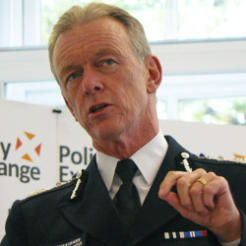One of Britain’s most senior police officers warned yesterday that charity donation boxes could be used to fund terrorist groups.
Sir Bernard Hogan-Howe, commissioner of the Metropolitan Police, told the BBC’s Andrew Marr Show that the public should be careful about dropping money into charity boxes because it might ultimately be used to fund terrorism.
“Are those charity boxes actually going to charity or are they going to someone else?” he said. “We want to cut off the tools the terrorists use, where they’re going to get weapons.”
He said that Scotland Yard will this week seek public support to tackle terrorism and cut off funding for extremist groups.
According to Hogan-Howe, officers foiled four or five terror plots by Muslim extremists this year, compared with one a year normally. He warned there has been a “change to the drumbeat, we’ve seen a change to the frequency and the seriousness of the types of plots that we’re looking at”.
An estimated 500 British people have gone to fight in Syria and Iraq and he said that on their return to the UK, they would be “militarised... have a complex network of people they know and they will have learnt tactics that they may want to use here”.
However he said the police wanted to work with other charities to prevent individuals being radicalised.
"We cannot eliminate the risk of abuse"
Michelle Russell, head of investigations and enforcement at the Charity Commission told Civil Society News: “We know that unfortunately there are some people out there who will abuse the name and work of charities and have used the cover of emergency appeals to collect and use money for themselves or divert it for criminal purposes. We want to ensure that this does not happen. We cannot eliminate the risk of abuse, however, there are some steps that both charities and the public can take to ensure the money only goes to help people in need.
"Many local authorities will not issue licences for street collections unless they are collecting on behalf of a registered charity. So don’t be afraid to ask questions, look up the charity name and number and if in doubt, go online or give directly to the charity in other ways.
"We want people to give and to give with confidence to charity. Donors should be able to make informed choices about who to give to and how – and, when asked for money, we would encourage them to ask questions to ensure that they are giving to genuine charities and their money will be used effectively."
Paula Sussex, chief executive of the Charity Commission, denied last week that the regulator is unfairly targeting Muslim charities. Her comments followed reports in national newspapers that dozens of British Muslim groups are being covertly monitored by the Commission amid concerns that they may be involved with radicalisation and extremism.
“On a bleak day it makes me sad that oxygen is being taken up by these topics when oxygen needs to be going into vital issues in the sector,” she said. “We get a momentous amount of criticism that is entirely unfounded about being anti-Muslim. It's completely untrue. The most important thing we’ve done is gone to the major Muslim charities to sit and spend some hours with them and tell them that this is completely untrue. I think this is perhaps important and with all media scrutiny on charities as well as ourselves, it’s a question of going out and saying this is not the case."
Earlier this month, the Charity Commission confirmed that 86 British charities are under scrutiny amid concerns of links to Isis fighters in Syria. The separate cases include 37 organisations working to help victims of the crisis in Syria. Four of the charities are under full statutory inquiry, including Children in Deen, Aid Convoy, Syria Aid and Al Fatiha Global - the charity that employed executed aid worker Alan Henning.










